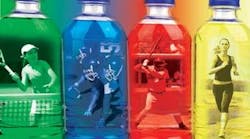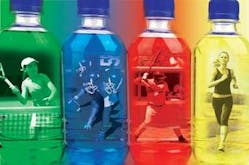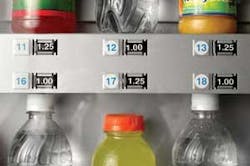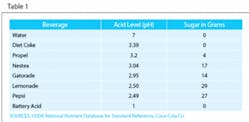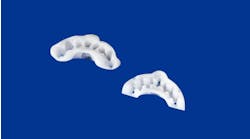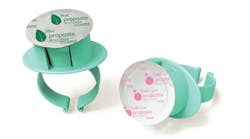Sports drinks and fitness waters are no safer than sodas when it comes to tooth erosion.
by Darlene Jones, RDH, MS
It's a typical morning in the life of a busy mother. Before getting the children up for school and showering, she runs five miles on her home treadmill…
We see a college student jogging for 45 minutes after his afternoon class…
A group of neighborhood boys are playing basketball in a local park in the evening…
What do all these people have in common? They are all needing to rehydrate after exercising. Water used to be the most common and plentiful option, but now most supermarkets and convenience stores are stocked with sports drinks and designer flavored waters. If we listen to the television advertisement or believe magazine layouts, we should drink a bottle or can of energy drink every time we work hard enough to "break a sweat." But do we really need these drinks or are they just adding calories and sugar to our daily diets? "Any boost you get from drinking them is solely from the sugar and caffeine. It's a way of peddling soda to the health-conscious crowd," said Dr. David Katz, physician and nutrition expert at Yale University School of Medicine. Most importantly, what effect do these added sugars and acid have on tooth enamel?
Let's analyze the ingredients in an average 8-ounce glass of sports drink. Most sports drinks have between 80 to 150 calories, with their "diet" counterparts averaging around 10. None of the energy drinks provide protein or fiber. The bulk of the calories from these sports and energy drinks come from the sugar content. The average sports drink contains 28 grams of sugar; an 8-ounce serving of Pepsi has 21 grams, but we must consider how these sodas and sports drinks are usually consumed. We don't want to be fooled by the serving size. The typical serving size is an 8-ounce serving for soda, sports, and energy drinks. The average energy or sports drink container is usually the same size as a soda (16 ounces) and we normally drink the whole can or bottle as one serving, so we could actually be consuming from 160 to 300 calories after our workout, possibly defeating the purpose of our efforts. For the typical human, averaging about 150 pounds, an hour of basketball, running, or treadmill exercise burns approximately 422 calories. By consuming only one 16-ounce energy drink, we have not only replaced the fluids we spent, but also replaced the calories! If the same amount of water was consumed after a workout, you would be rehydrated and closer to your goal of maintaining or losing weight by exercising. Do you need the extra calories the drinks supply?
From a dental aspect, are these energy drinks really that much different from soda? The detrimental effects of acid and sugar on tooth enamel has been well documented concerning sodas and carbonated drinks (see Table 1).
But how different are these energy and sports drinks? Looking at the ingredients, energy drinks appear to be part soft drink and part nutritional supplement. As the lead author from the University of Maryland Dental School, J. Anthony von Fraunhofer stated, "study revealed that the enamel damage caused by non-cola and sports beverages was three to 11 times greater than cola-based drinks, with energy drinks and bottled lemonades causing the most harm to dental enamel." According to a previous study in the July/August issue of General Dentistry, non-colas and canned iced teas can more aggressively harm dental enamel than colas. The study continuously exposed enamel, from caries-free molars and premolars, to a variety of popular sports beverages, including energy drinks, fitness waters, and sports drinks, as well as non-cola beverages like lemonade and iced tea. This study was for a period of 14 days or 336 hours. The exposure time was equivalent to 13 years of normal beverage consumption. As reported by the General Dentistry authors, lemonade, energy drinks, and sports drinks caused the most damage, with fitness water, iced tea, and cola coming in far behind. The study found that most cola-based drinks contain one or more acids, usually phosphoric or citric acids, but sports drinks contain additives and organic acids that can advance dental erosion. These organic acids are very erosive to dental enamel because of their ability to break down calcium. Dr. John Ruby, a pediatric dentist and associate professor at the University of Alabama at Birmingham School of Dentistry, found that drinks with a pH level of below 4 cause tooth enamel erosion. As the following chart shows, all popular sports drinks and sodas are considered erosive to teeth. Some drinks, with their high content of sugar, pack a double punch to the enamel. As Dr. Ruby states, "You can't replace enamel. All you can do is cover it with a restoration."
In conclusion, sports drinks and fitness waters are no safer than sodas when it comes to tooth erosion. For daily, average exercise, water is sufficient for rehydration. The normal person does not need the added empty calories to their daily intake. It would be better to alternate or limit the intake of soda and sports drinks and choose water to preserve tooth enamel and ultimately protect teeth from decay.
About the Author
Darlene Jones, RDH, MS, has been practicing dental hygiene for more than 30 years in Ohio, Texas, Wisconsin, and Michigan. She has worked in pediatric dentistry, periodontics, cosmetics, and is currently a clinical hygienist at the University of Michigan serving the low income population. In Texas, she created and was president of Wichita Falls Dental Hygiene Study Club, which is still providing continuing education for its members. She completed her master's in public administration in 2001. She is currently a part-time clinical instructor/faculty member at Wayne County Community College. She can be contacted at [email protected].
